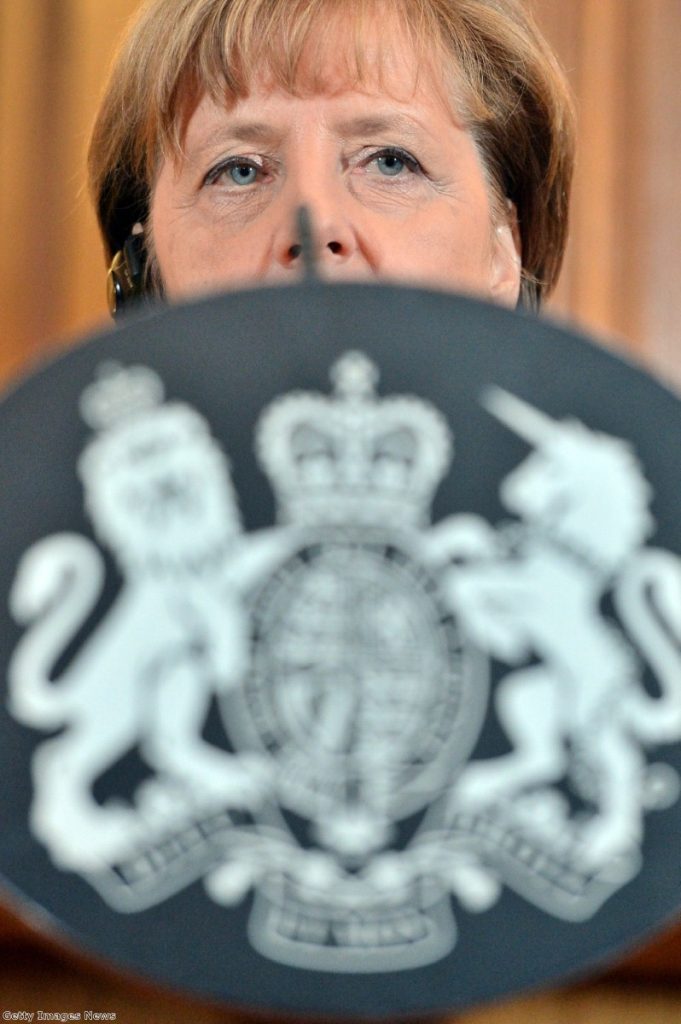Angela Merkel is saving the British economy
During his joint press conference with Angela Merkel yesterday, David Cameron reminded journalists of the "very clear things I've set out" on European migration. It's always worth paying attention when the prime minister mentions his "very clear" statements, because he's usually about to pull a fast one. This time it seems he was dropping one of his most extreme anti-immigration policies.
He said:
"The very clear things I've set out is saying that if you come here you should not be here for unemployment benefit; if you come and you haven't found a job in six months, you should return to your country of origin; if you haven't paid in to the system for four years, you can't start to get out of the system; and, if your family and your children are back at home in another European country, you shouldn't be getting child benefit here in Britain. Those are four of the welfare and immigration steps I've set out."
It's telling that Cameron specifically numbered the policies, because there was a rather significant one he left out – blocking EU workers from coming to the UK unless they had a job offer.


This is what he said during his keynote November speech on European immigration:
"We want EU jobseekers to have a job offer before they come here and to stop UK taxpayers having to support them if they don't."
Cameron has not said the policy is being dropped, but its absence, especially when he is being so "clear" and numbering them, suggests Angela Merkel has slapped it down. It was always the aspect of his speech which he would have most struggled to get past European authorities.
The omission comes hot on the heels of reports which suggest the German chancellor also succeeded in making Cameron drop a cap on EU citizens coming to the UK. The Mail reported the plans were dropped 48 hours before the much-hyped November speech because they would have fundamentally threatened European freedom of movement.
It makes sense. There was plenty of talk in the weeks leading up to the speech of an 'emergency brake' and other robust measures which weren't to be found in its text. It seems the relatively moderate nature of it was more the result of Merkel's intervention rather than Cameron's restraint.
Merkel is clearly working closely with Cameron to get his benefits policies through without allowing him to threaten freedom of movement. That, of course, is in Germany's interest as well as the EU's. It also wants to clamp down on benefit entitlements, but not on the movement of people.
But it is also in Britain's interest. As UCL's Centre for Research and Analysis of Migration found, European migrants made a net contribution of £20 billion to UK public finances between 2000 and 2011. Those from the 15 EU countries from before the 2004 expansion contributed £15 billion more in taxes than they received in welfare. Those from eastern European states which joined after 2004 contributed £5 billion more.
As Robert Chote, chair of the Office of Budget Responsibility, said, cuts to immigration will increase Britain's debt-to-GDP ratio.
"They're more likely to be working age, they're more likely to be paying taxes and less likely to have relatively large sums of money spent on them for education, for long-term care, for healthcare, for pension expenditure."
The Office of Budget Responsibility found that if immigration was maintained at 140,000 a year, the national debt will reach 99% of the entire economy in 50 years. Without immigration it hits an unthinkable 170%.
It may be difficult to watch a British prime minister being so blatantly overruled by a German chancellor, but we should be grateful for it. Merkel is acting for her own domestic and continental reasons, but her interventions are saving the British economy from the sabotage Cameron seems intent on inflicting on it.









